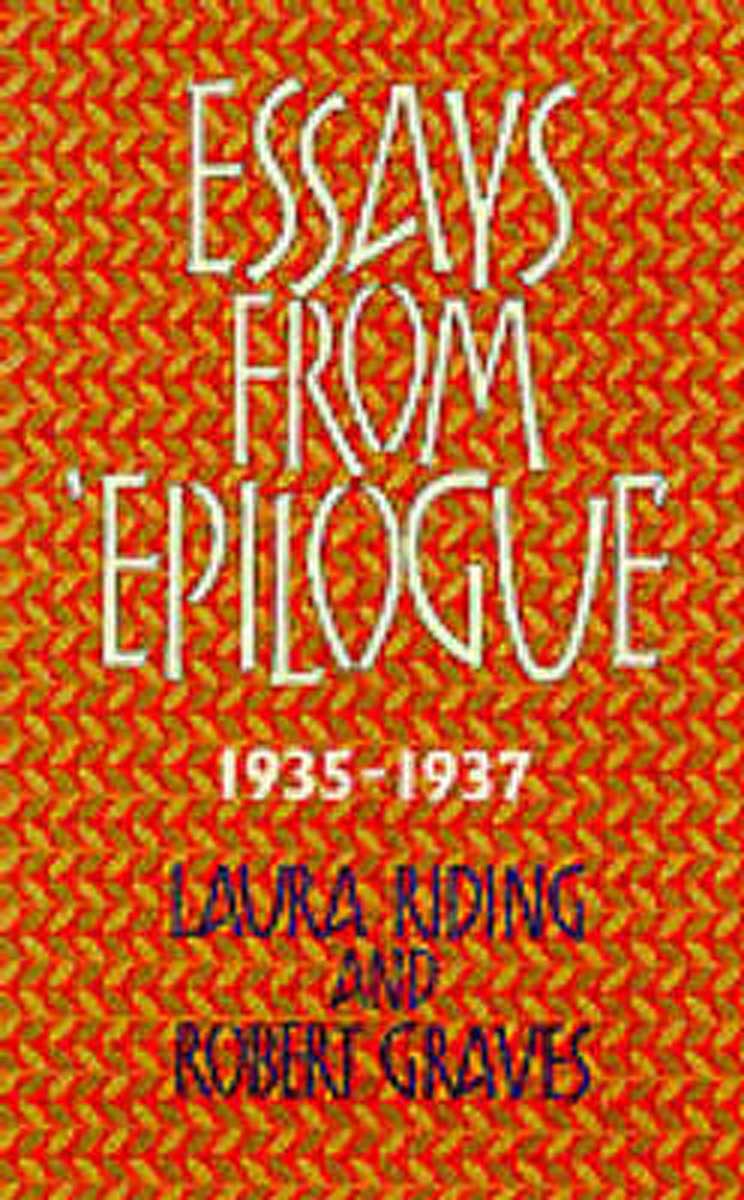Essays from "Epilogue"
1935-1937
"The Epilogue essays", published when the literary partnership of Laura Riding and Robert Graves was at its height, illustrate their working relationship and the back-ground to their later very different careers.
Conceived in the mid-1930s by Laura Riding, "Epilogue: A Critical Summary" was originally to be called "The Critical Vulgate", a title suggesting that the thematic concerns of the project would go well beyond the merely literary, attempting to discover, in a secular spirit reminiscent of Voltaire's, the truth regarding all sorts of subjects, from God down. In 1935 "The Idea of God" led off the extraordinary experiment of Epilogue. The effort was to be encyclopaedic, and in this respect the project foreshadows Riding's later life-work, the massive Rational Meaning which she and her husband Schuyler B. Jackson undertook.
The original four volumes, published by Seizin Press (Majorca) and Constable jointly, are now extremely scarce. Quite apart from their considerable intrinsic interest, they offer rich source material for the two authors. Laura (Riding) Jackson never reprinted any of her Epilogue work, while Robert Graves republished some of his, in revised form. This selection alerts general readers to a rigorous, impassioned and remarkably alive creative and critical moment.
Conceived in the mid-1930s by Laura Riding, "Epilogue: A Critical Summary" was originally to be called "The Critical Vulgate", a title suggesting that the thematic concerns of the project would go well beyond the merely literary, attempting to discover, in a secular spirit reminiscent of Voltaire's, the truth regarding all sorts of subjects, from God down. In 1935 "The Idea of God" led off the extraordinary experiment of Epilogue. The effort was to be encyclopaedic, and in this respect the project foreshadows Riding's later life-work, the massive Rational Meaning which she and her husband Schuyler B. Jackson undertook.
The original four volumes, published by Seizin Press (Majorca) and Constable jointly, are now extremely scarce. Quite apart from their considerable intrinsic interest, they offer rich source material for the two authors. Laura (Riding) Jackson never reprinted any of her Epilogue work, while Robert Graves republished some of his, in revised form. This selection alerts general readers to a rigorous, impassioned and remarkably alive creative and critical moment.
About the author
Laura (Riding) Jackson (1901-1991) is among the most influential yet misread writers of the twentieth century. She renounced poetry after her "Collected Poems" in 1938, a body of work which left its mark upon Auden, Ashbery and many others. Her collaborations and her own essays, stories and poems are central to the creative and critical debate surrounding twentieth-century English and American literature. Robert Graves (1895-1985), poet, classical scholar, novelist, and critic, was one of the greatest writers of the 20th Century. Athough he produced over 100 books he is perhaps best known for the novel "I, Claudius" (1934), "The White Goddess" (1948) and "Greek Myths" (1955).
Robert Graves was born in Wimbledon, South London. His father, Alfred Percival Graves, was a school inspector, and his mother, Amalie von Ranke Graves, was a great-niece of the German historian Leopold von Ranke (1795-1866). He was educated at Charterhouse, and awarded a B. Litt by St. John's College, Oxford after his return from World war I, where he served alsongside Siegfried Sassoon.
Robert Graves died in 1985 in Deja, the Majorcan village he had made his home (with the exception of the Spanish Civil War and the Second World War) since 1929.
Robert Graves was born in Wimbledon, South London. His father, Alfred Percival Graves, was a school inspector, and his mother, Amalie von Ranke Graves, was a great-niece of the German historian Leopold von Ranke (1795-1866). He was educated at Charterhouse, and awarded a B. Litt by St. John's College, Oxford after his return from World war I, where he served alsongside Siegfried Sassoon.
Robert Graves died in 1985 in Deja, the Majorcan village he had made his home (with the exception of the Spanish Civil War and the Second World War) since 1929.


